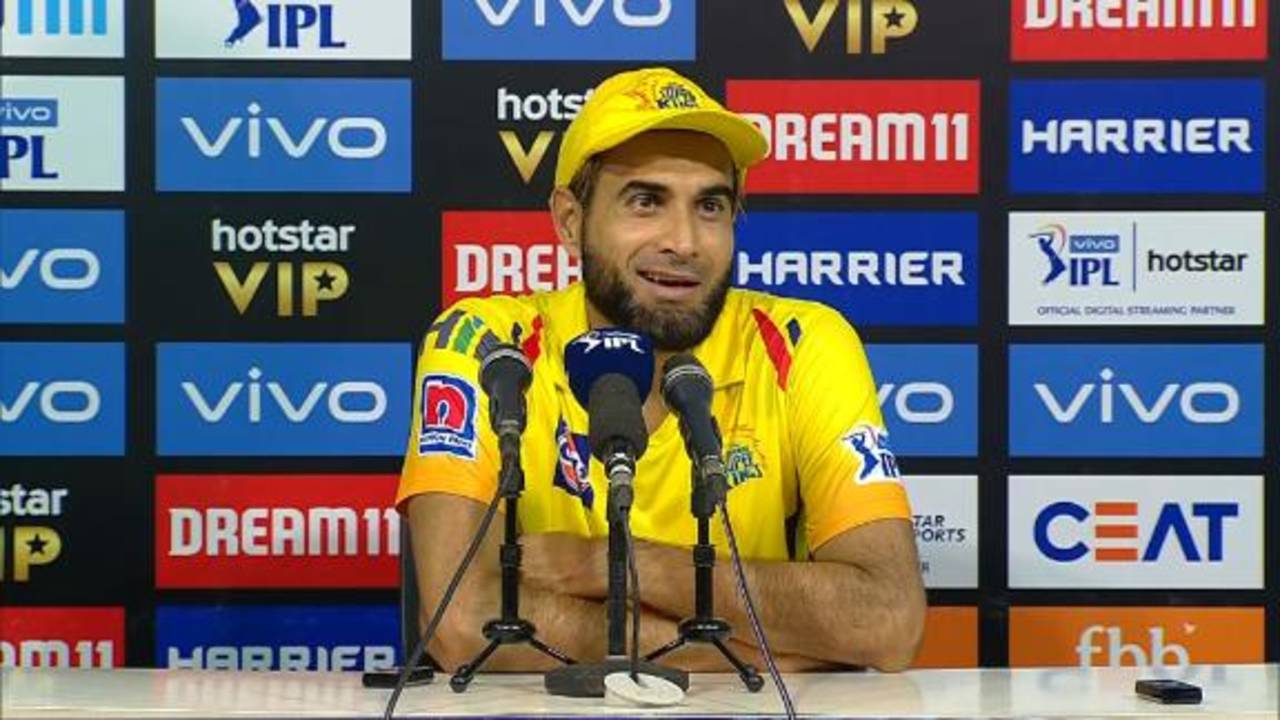Talking Points - MS Dhoni redefines 'par score' on dewy night
Plus, are Rajasthan Royals getting the best out of Rahul Tripathi?
Srinath Sripath
31-Mar-2019
The Dhoni par score
MS Dhoni walked in with Super Kings in a fair bit of trouble, at 27 for 3 in the fifth over. He had a slice of luck in the next over facing Jofra Archer with the ball rolling on to hit the stumps without the bails falling off. With Suresh Raina taking on the aggressor's role with a flurry of boundaries in the middle overs, Dhoni took his time to get going against Royals' spinners, taking singles and twos, not hitting a single boundary till his 17th ball.
With Raina falling in the 14th over, Dhoni targeted Jaydev Unadkat and Dhawal Kulkarni, taking them for 46 off 18 balls in the closing stages. When he couldn't crack boundaries, he ran harder and pinched ones and twos which at times felt risky. His urgency in the middle overs could well have come from the dew in evidence throughout the innings, meaning their spin-heavy attack could struggle to grip the ball as the night wears on, to give them a bigger target to play with.
The first of his four sixes came off a free hit on his 38th ball, and having put the Royals' pace attack under pressure at the death, he carted them for boundaries, first with cheeky nudges behind square, then muscling the big hits in the final over: three in the last three balls.
In short, it was a Dhoni classic: coming in after a flurry of early wickets, steadying the ship, always redefining what a "good score" is batting first. And believe it or not, after all these years, it is now his highest score in an IPL game in Chennai, and his second-highest IPL score overall.

MS Dhoni cracked three big sixes off Jaydev Unadkat's 20th over•ESPNcricinfo Ltd
What happened to Chennai's spin-friendly track?
The first game of IPL 2019 between Chennai Super Kings and Royal Challengers Bangalore saw the visitors crumble to 70 all out on a raging turner. It came under criticism from both captains for not being ideal for a T20 game. As many as eight of the 12 Powerplay overs were bowled by spinners from both sides, to a fair degree of success: three wickets for 26 runs.
Fast forward a week later, and a vastly different looking track saw a total of one over of spin bowled by both sides put together in the Powerplays. Royals bowled an all-pace Powerplay, a significant change since offspinner K Gowtham has opened the bowling in 15 of their 17 games since the start of last season. Mitchell Santner bowled Super Kings' sixth over, and was whacked for 17 runs.
On early evidence, it seemed like prudent judgment from Royals captain Ajinkya Rahane: their fast bowlers restricted Super Kings to 29 for 3 by the end of the Powerplay, the first time they have lost three in the first six at home since April 2010. There was significantly less purchase from the track, and the dew made it hard to grip the ball even in the first innings, meaning Royals' two spinners bowled a total of five overs between them.

ESPNcricinfo Ltd
Why don't we see more of Tripathi in the Powerplay?
Rahul Tripathi's batting position for the Royals is an old favourite on these pages. His breakout 2017 season for Rising Pune Supergiant came at the top of the order, and was characterised by consistent boundary-hitting against pace bowlers. It is now a forgotten fact that Tripathi started off at No.4, before his hitting prowess against pace bowlers got the Supergiants think-tank, led by their then coach Stephen Fleming, to promote him to the top of the order.
Last season, Tripathi spent a number of games being shuffled around the middle order, then back up to the opening spot for a couple of games, before Royals hit the jackpot with Jos Buttler in May. Tripathi did open with Buttler a couple of times, making a match-winning 80* off 58 against Royal Challengers Bangalore, in one of their final league games.
Royals' 2019 season hasn't got off to the greatest of starts, but Tripathi showed flashes of his 2017 game after coming in at the start of the fourth over. He struck at 170 off his first ten balls, dragging Royals to 45 for 3 by the end of the Powerplay. Tripathi finished with 39 off 24 balls, struggling to take on Imran Tahir in the tenth over, having made the case, yet again, that Royals are better off putting his boundary-hitting to use up top than fitting him in the middle order.

BCCI
Did Dhoni time ball-change to perfection?
"MS Dhoni's picked exactly the right moment (to change the ball). When there's a 50-50 chance for either side to win, he tries to swing the pendulum in his (side's) favour", said Kumar Sangakkara, former Sri Lanka captain on Star Sports' Select DugOut.
From 56 needed to win off 24 balls, Ben Stokes and Jofra Archer had brought the equation down to 25 off 12 at the start off the 19th over. On a night when dew made gripping the ball increasingly difficult as it wore on, Sangakkara reckoned Dhoni could have requested the umpires for a fresh, dry ball when things started getting tricky for Super Kings.
"When the captain will call, the pressure will be on the umpires to change that ball. It's got to be very tactical. When the crunch is on, you want a fresh, dry ball in your hands for your fast bowlers", he said. ESPNcricinfo's Forecaster had Super Kings 62% favourites with two overs left.
As things turned out, despite Stokes' one-handed six in the 19th over, Dwayne Bravo held his nerve to defend 12 off the final over, picking up two wickets.
Srinath Sripath is a sub-editor at ESPNcricinfo
